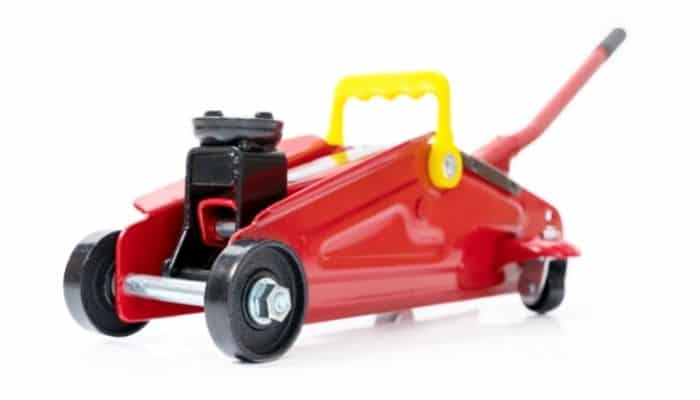In Brief: How To Maintain Your Floor Jack
To maintain your floor jack ensure you store it upright and released in a dry, dust-free environment. Before use, you must inspect it for damage. After you have used the floor jack, clean it with a damp cloth and lubricate using grease. Keep the hydraulic oil topped up and remember to bleed the system to maintain lifting power.
However, to get the most out of your floor jack, you will need to perform thorough routine maintenance to keep it in top condition.
This guide will take you through all the steps you need to perform to maintain your floor jack.
How To Maintain Your Floor Jack
Follow these steps to keep your floor jack in proper working condition.
Storage Precautions
The number one way in which floor jacks deteriorate over time relates to how they are stored.
Always store the floor jack upright so that you can avoid leaking hydraulic oil.
Before storing it away, release pressure from the jack.
Not only does releasing the pressure make the tool more compact and easier to store, but it also releases stress on the system that can contribute to the deterioration of various components.
Dust & Moisture Protection
When not in use, you should use some form of dust and moisture protection to prevent the deterioration of mechanical and structural components.
A simple dust sheet will suffice, as long as you have somewhere cool and dry to keep the jack.
Never store your floor jack outside as the exposure to moisture and mud will contribute to rusting and clogging within the mechanical parts.
Regularly Inspect For Damage
You must inspect your floor jack for damage before you use it. Any cracks, deformations, or other signs of damage need to be spotted before they cause a failure.
Pay particular attention to the lifting arm and the handle.
These two components are the parts of the floor jack that come under the most stress, so they are also the most important points of failure for which you need to check.
Keep It Clean
A garage or workshop can be a messy place. During use, a floor jack could accumulate dirt, oil, and grit, which can clog up the mechanical parts of the jack.
Thoroughly clean the floor jack after use. A damp cloth and some soapy water will usually do the trick, but ensure to dry it out before storing it away.
Regular Lubrication
After cleaning your floor jack, now is a great time to lubricate the moving parts.
Not only does lubrication prevent any sticking or squeaking when the jack is in use, but it also provides an element of moisture protection while it is stored.
You could use oil, but there are downsides to using oil as a lubricant in this way. We prefer to use grease as a lubricant as it improves the performance of the floor jack.
Use Quality Oil
Your floor jack needs hydraulic oil to function.
With the release valve opened and the handle down, remove the oil filler cap and inspect the oil level. It should come almost to the top. If it does not, you will need to add some hydraulic oil.
Once topped up, replace the filler cap and bleed the jack.
Precautions while Bleeding a Floor Jack
After topping up the oil, or if your jack is not pumping smoothly, you will need to bleed the air out of the cylinder.
To do so, open the release valve and pump the handle at least 20 times. All the air will be removed and internal components will be adequately lubricated.
Close the release valve and check that the jack will hold elevation. If it does not, then you will need to keep bleeding it.
Summary
We hope this guide to floor jack maintenance has helped you learn how to properly maintain your hydraulic floor jack.
Armed with the right tools, you can make your floor jack last a lifetime of service.
If you have any questions or comments about this guide or floor jacks in general, please feel free to leave them in the comments section below.

